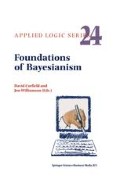Abstract
Bayesian theory now incorporates a vast body of mathematical, statistical and computational techniques that are widely applied in a panoply of disciplines, from artificial intelligence to zoology. Yet Bayesians rarely agree on the basics, even on the question of what Bayesianism actually is. This book is about the basics — about the opportunities, questions and problems that face Bayesianism today.
Access this chapter
Tax calculation will be finalised at checkout
Purchases are for personal use only
Preview
Unable to display preview. Download preview PDF.
Bibliography
Thomas Bayes. An essay towards solving a problem in the doctrine of chances. Philosophical Transactions of the Royal Society of London, 53, 370–418, 1764.
James O. Berger. Bayesian analysis: a look at today and thoughts of tomorrow. Journal of the American Statistical Association, 95 (December), 2000.
Christopher M. Bishop. Neural networks for pattern recognition. Oxford University Press, 1995.
G. Box G. Tiao. Bayesian Inference in Statistical Analysis. Addison-Wesley, 1973.
Carnap, 1950] Rudolf Carnap. Logical foundations of probability. Routledge & Kegan Paul Ltd, 1950. Second edition 1962.
Rudolf Carnap & Richard C. Jeffrey(eds.). Studies in inductive logic and probability, Volume 1, University of California Press, 1971.
A.P. Dawid. The well-calibrated Bayesian. With discussion, Journal of the American Statistical Association, 77, 604–613, 1982.
John Earman. Bayes or bust?. M.I.T. Press, 1992.
Bruno de Finetti. Foresight. Its logical laws, its subjective sources. In [Kyburg & Smokier, 1964], 53–118, 1937.
H. Gaifman & M. Snir. Probabilities over rich languages. Journal of Symbolic Logic, 47, 495–548, 1982.
Andrew B. Gelman, John S. Carlin, Hal S. Stern & Donald B. Rubin. Bayesian data analysis. Chapman & Hall/CRC, 1995.
Gillies, 2000] Donald Gillies. Philosophical theries of probability. Routledge, 2000.
Glymour & Cooper, 1999] Clark Glymour & Gregory F. Cooper(eds.). Computation, causation, and discovery. M.I.T. Press, 1999.
Daniel M. Hausman. The mathematical theory of causation. Review of [McKim & Turner, 1997], British Journal for the Philosophy of Science, 50, 151–162, 1999.
Daniel M. Hausman & James Woodward. Independence, invariance and the causal Markov condition. British Journal for the Philosophy of Science, 50, 521–583, 1999.
Eric Horvitz, Jack Breese, David Heckerman, David Hovel & Koos Rommelse. The Lumière Project: Bayesian user modeling for inferring the goals and needs of software users. In Proceedings of the Fourteenth Conference on Uncertainty in Artificial Intelligence,Morgan Kaufmann, pages 256–265, 1998.
Howson & Urbach, 1989] Colin Howson & Peter Urbach. Scientific reasoning: the Bayesian approach. Open Court, 1989. Second edition, 1993.
Jaynes, 1998] E.T. Jaynes. Probability theory: the logic of science. http:// bayes. w ustl. edu/etyprob.html.
Michael I. Jordan(ed.). Learning in Graphical Models. MIT Press, Cambridge, MA, 1998.
J. Kadane, M. Schervish & T. Seidenfeld(eds.). Rethinking the Foundations of Statistics. Cambridge University Press, 1999.
John Maynard Keynes. A treatise on probability. Macmillan, 1948.
Kyburg & Smokier, 19641 H.E. Kyburg & H.E. Smokler(eds.). Studies in subjective probability. 1964. Second edition, Robert E. Krieger Publishing Company, 1980.
Pierre Simon — Marquis de Laplace. A philosophical essay on probabilities. Dover, 1951.
David K. Lewis. A subjectivist’s guide to objective chance. In [Lewis, 1986], 83–132, 1980.
David K. Lewis. Philosophical papers II. Oxford University Press, 1986.
McKim & Turner, 1997] Vaughn R. McKim & Stephen Turner. Causality in crisis? Statistical methods and the search for causal knowledge in the social sciences. University of Notre Dame Press,1997.
Stephen Muggleton & Luc de Raedt. Inductive logic programming: theory and methods. In Journal of Logic Programming, 19, 20, 629–679, 1994.
J.B. Paris & A. Vencovskâ. A note on the inevitability of maximum entropy. International Journal of Approximate Reasoning, 4, 181–223, 1990.
Pearl, 1988] Judea Pearl. Probabilistic reasoning in intelligent systems: networks of plausible inference. Morgan Kaufmann, 1988.
Pearl, 2000] Judea Pearl. Causality: models, reasoning, and inference. Cambridge University Press, 2000.
Frank Plumpton Ramsey. Truth and probability. In [Kyburg & Smokier, 1964], 2352, 1926.
H. Rubin. A Weak System of Axioms for “Rational” Behavior and the Nonseparability of Utility from Prior. Statistics and Decisions, 5, 47–58, 1987.
David J. Spiegelhalter, A. Philip Dawid, Steffen L. Lauritzen & Robert G. Cowell. Bayesian analysis in expert systems. Statistical Science,8(3), 219–283, with discussion, 1993.
D.J. Spiegelhalter, J.P. Myles, D.R. Jones & K.R. Abrams. Bayesian methods in health technology assessment: a review. Health Technology Assessment,4(38), 2000. [Spirtes et al.,1993] Peter Spirtes, Clark Glymour & Richard Scheines. Causation, Prediction, and Search. Lecture Notes in Statistics,81, Springer-Verlag, 1993.
Vladimir N. Vapnik. The nature of statistical learning theory. Springer-Verlag, 1995. Second edition 2000.
Jon Williamson Countable additivity and subjective probability. British Journal for the Philosophy of Science, 50 (3), 401–416, 1999.
Jon Williamson. Probability logic. In Dov Gabbay, Ralph Johnson, Hans Juergen Ohlbach & John Woods (eds.), Handbook of the Logic of Inference and Argument: The Turn Toward the Practical, Elsevier, 393–419, 2000.
Jon Williamson. Bayesian networks for logical reasoning. Proceedings of the 8th Workshop on Automated Reasoning, A. Voronkov (ed.), 55–56, 2001.
Author information
Authors and Affiliations
Editor information
Editors and Affiliations
Rights and permissions
Copyright information
© 2001 Springer Science+Business Media Dordrecht
About this chapter
Cite this chapter
Williamson, J., Corfield, D. (2001). Introduction: Bayesianism into the 21st Century. In: Corfield, D., Williamson, J. (eds) Foundations of Bayesianism. Applied Logic Series, vol 24. Springer, Dordrecht. https://doi.org/10.1007/978-94-017-1586-7_1
Download citation
DOI: https://doi.org/10.1007/978-94-017-1586-7_1
Publisher Name: Springer, Dordrecht
Print ISBN: 978-90-481-5920-8
Online ISBN: 978-94-017-1586-7
eBook Packages: Springer Book Archive

